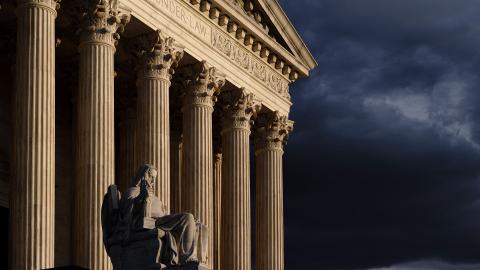
US Supreme Court to Hear Major Abortion Case After Upholding Idaho's Pro-Life Law
The U.S. Supreme Court is allowing Idaho to uphold its near-total abortion ban, while also agreeing to hear a lawsuit by the Biden administration challenging the state's law.
The high court granted a request by Idaho officials last Friday to temporarily lift a federal judge's ruling that blocked the state's pro-life measure.
Idaho's Defense of Life Act imposes penalties on physicians who perform prohibited abortions unless doing so is necessary to save the life of a pregnant woman and includes other exceptions.
The pro-life law was enacted in 2020 and took effect when the Supreme Court overturned Roe v. Wade in June 2022. The law includes provisions that make it a felony for anyone who performs or assists in an abortion, with penalties of imprisonment for a minimum of two years and a maximum of five years. Those violating the law could be fined up to $20,000.
However, the U.S. Department of Justice claimed the state's abortion ban is preempted by the 1986 Emergency Medical Treatment and Labor Act (EMTALA), a federal law that requires hospitals that receive Medicare funds to provide emergency medical care.
The DOJ argued that EMTALA requires health care providers perform abortions because it contends they can be a necessary component of emergency medical care.
In August 2022, a U.S. district judge agreed with the DOJ that Idaho's law violated EMTALA and issued a temporary injunction, blocking the law from taking effect.
"The doctor believes her EMTALA obligations require her to offer that abortion right now. But she also knows that all abortions are banned in Idaho. She thus finds herself on the horns of a dilemma. Which law should she violate," U.S. District Court Judge Lynn Winmill wrote.
Last September, the 9th Circuit Court of Appeals reversed that injunction, allowing the ban to stay in effect for two weeks.
Then, last November, attorneys with the non-profit Alliance Defending Freedom (ADF) and Cooper & Kirk assisted the Idaho Attorney General's office in filing an emergency application for a stay pending appeal with the U.S. Supreme Court.
"Hospitals—especially emergency rooms—are centers for preserving life. The government has no business transforming them into abortion clinics," said ADF Senior Counsel Erin Hawley, vice president of the Center for Life and Regulatory Practice.
"Emergency room physicians can, and do, treat ectopic pregnancies and other life-threatening conditions. But elective abortion is not life-saving care—it ends the life of the unborn child—and the government has no authority to override Idaho's law barring these procedures. We urge the Supreme Court to halt the lower court's injunction and allow Idaho emergency rooms to fulfill their primary function—saving lives," she added.
The Supreme Court's recent decision to not only take up the case but also allow for protections for preborn life signals another showdown over abortion access.
"These bans are also forcing doctors to leave Idaho and other states," President Joe Biden said in a statement released by the White House.
He added that Idaho's ban essentially "denies women critical emergency abortion care" adding it continues "to jeopardize women's health, force them to travel out of state for care."
But Ethics of Religious Liberty Commission wrote in a statement, "ER physicians should not be forced to choose between violating their conscience by performing abortions and being excluded from federal programs, such as Medicare, by a manipulation of existing law under EMTALA."
"The Supreme Court's decision to review this case is potentially a step toward upholding the state's near-total ban on abortion, which helps protect preborn life," it continued.
Heather Lawless, the director of the Reliance Center in Lewiston, ID, weighed in on the high court's decision stating, "Abortion is not a medical procedure aimed at saving lives in emergency situations."
"The recent decision by the Supreme Court to allow Idaho to enforce its abortion ban in emergency room situations is a critical step in upholding the sanctity of life. This decision underscores the fundamental pro-life stance that prioritizes the protection of both the mother and the unborn child in emergency medical situations," she said in a statement.
Meanwhile, the ADF and Idaho's attorney general applaud the Supreme Court's decision to take up the case.
"We are very pleased and encouraged by the Supreme Court's decision today. The federal government has been wrong from day one. Federal law does not preempt Idaho's Defense of Life Act. In fact, EMTALA and Idaho's law share the same goal: to save the lives of all women and their unborn children. Today, the Supreme Court's decision is a big step in stopping the administration's lawless overreach. The people of Idaho have spoken with clarity on the issue of life," said Idaho Attorney General Raúl Labrador in a statement.
The high court also said it would hear oral arguments on the issue in April and issue a ruling by the end of June.
***Please sign up for CBN Newsletters and download the CBN News app to ensure you keep receiving the latest news.***




